#courses in Diabetology
Explore tagged Tumblr posts
Text
The Delhi Medical Health Care Academy is proud to offer the best institute for certificate courses in Diabetology. This comprehensive program is designed to provide students with a thorough understanding of the diagnosis, treatment, and management of diabetes. Our experienced faculty members are dedicated to providing students with the knowledge and skills necessary to excel in this field.
#certificate courses in Diabetology#courses in Diabetology#Delhi Medical Health Care Academy#Diabetology courses
0 notes
Text
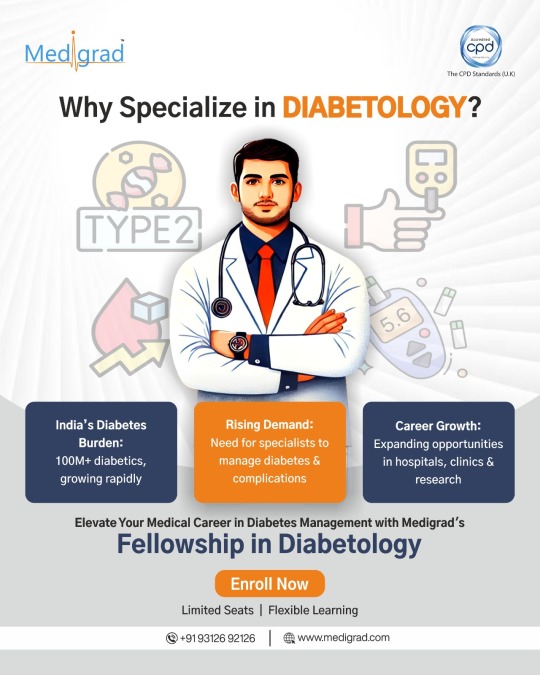
A Fellowship in Diabetology is the Best Post-MBBS Course for Physicians to Advance Their Medical Careers
Searching for the top fellowship to further your knowledge after earning your MBBS? Medigrad's Fellowship in Diabetology is intended for medical professionals who want to receive specialized training in managing diabetes. This post-MBBS fellowship course is a great option for professionals because it allows for flexible study.
Diabetology professionals are in great demand due to the sharp increase in diabetes incidence. After earning an MBBS, this diabetic fellowship provides access to fulfilling jobs in clinics, hospitals, and research.
Medigrad also offers other top fellowship courses after MBBS, including: ✅ Fellowship in Emergency Medicine – Enhance critical care expertise ✅ Fellowship in Neonatology – Specialized training for newborn care ✅ Fellowship in Family Medicine – Broaden your scope in primary care ✅ Fellowship in Infectious Disease – Learn to manage global health challenges ✅ Fellowship in Pediatrics – Specialized child healthcare training ✅ Fellowship in Critical Care Medicine – Advanced ICU care skills ✅ Gynecologist Course – Enhance expertise in women’s health Why Choose Medigrad? ✔️ Online learning flexibility ✔️ CPD (UK) accredited courses ✔️ Industry-relevant curriculum ✔️ Recognized certification Take the next step in your medical career with the best post-MBBS course. Enroll now! 📞 Call: +91 93126 92126 🌐 Learn More: https://medigrad.com/courses/fellowship-in-diabetology/
0 notes
Text
Tips for Balancing Work and Life During Your Fellowship
Fellowship in Diabetology by Virtued Academy International
Diabetes has emerged as one of the most pressing global health challenges, affecting millions worldwide. Understanding its complexities and managing it effectively requires advanced training and expertise. Fellowship in Diabetology Recognizing this need, Virtued Academy International, in collaboration with the International Association of Therapists (IAOTH), UK, offers a comprehensive Fellowship in Diabetology program designed to empower healthcare professionals with cutting-edge knowledge and practical skills.
Program Overview
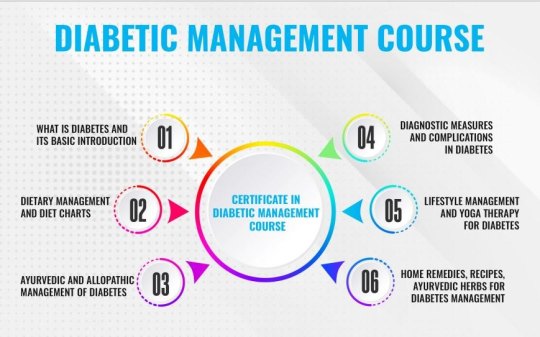
Key Highlights
Comprehensive Curriculum:
Covers all aspects of diabetes management, including prevention, diagnosis, treatment, and lifestyle interventions.
Explores advanced topics such as insulin therapy, diabetes complications, and the integration of technology in diabetes care.
Practical Training:
Participants gain hands-on experience in managing diabetes in diverse clinical settings.
Case studies and real-world scenarios help translate theory into practice.
International Collaboration:
Jointly certified by Virtued Academy International and the IAOTH, UK, providing a globally recognized credential.
Access to a network of international experts and resources.
Flexible Learning:
Designed to accommodate the busy schedules of healthcare professionals.
Combines online modules with in-person workshops for a balanced learning experience.
Why Choose This Fellowship?
Expert Faculty: Learn from leading endocrinologists, diabetologists, and healthcare educators.
Career Advancement: Enhance your professional credentials with a specialization in one of the most in-demand fields of healthcare.
Global Recognition: Earn a certificate that is recognized internationally, opening doors to opportunities worldwide.
Impactful Learning: Make a real difference in patients' lives by mastering the art and science of diabetes management.
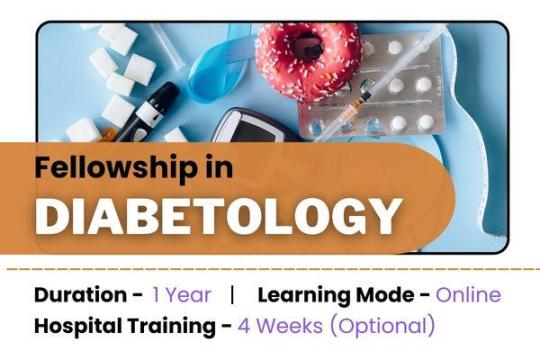
Who Should Enroll?
This program is ideal for:
General practitioners aiming to expand their practice to include specialized diabetes care.
Nurses and allied health professionals seeking advanced knowledge in diabetes management.
Medical students and trainees aspiring to a career in diabetology.
Dietitians and nutritionists involved in creating diabetes-friendly meal plans and promoting lifestyle modifications.
Public health professionals working to design and implement community-based diabetes prevention programs.
Enrollment Details
Duration: Flexible schedule with modules designed to fit your availability.
Format: Blended learning with online and in-person components.
Eligibility: Open to healthcare professionals with a relevant medical or health sciences background.
Certification: Participants will receive a Fellowship in Diabetology certificate upon successful completion, endorsed by both Virtued Academy International and IAOTH, UK.
Additional Benefits
Networking Opportunities: Connect with peers and mentors from across the globe, fostering professional relationships and collaboration.
Access to Resources: Enjoy exclusive access to the latest research, guidelines, and tools in diabetes management.
Ongoing Support: Post-completion, participants gain access to webinars, workshops, and updates to stay current with emerging trends in diabetology.
Holistic Approach: Learn about integrating mental health and lifestyle coaching into diabetes care for a more comprehensive patient management strategy.
How to Apply
To enroll in the Fellowship in Diabetology program, visit the Virtued Academy International website and complete the online application form. For further inquiries, contact our admissions team via email or phone. Early applications are encouraged as spots are limited to ensure personalized attention and quality education.
Conclusion
The Fellowship in Diabetology offered by Virtued Academy International and IAOTH, UK, represents a unique opportunity for healthcare professionals to advance their careers and contribute to the global fight against diabetes. With its rigorous curriculum, practical focus, and international recognition, this program is your gateway to becoming a leader in diabetes care.
Diabetes management is not just a medical challenge but also a mission to improve the quality of life for millions of individuals. By joining this program, you take a step towards making a significant impact in the healthcare landscape.
Take the next step in your professional journey—apply today and make a lasting impact in the world of healthcare.
1 note
·
View note
Text
Post Graduate Diploma in Diabetology
A Postgraduate (PG) Diploma in Diabetology is a specialized program designed to provide advanced knowledge and skills related to the diagnosis, treatment, and management of diabetes.
The highly specialized research backed (RCT's + SRMA) PGD in Diabetology is aimed towards MBBS graduates who wish to master the clinical and management aspects of diabetes with a strong theoretical foundation backed by a robust hands on practical training. The program is tailor made for the primary care physicians working in the subcontinent population where diabetes has taken the shape of an epidemic and need to have the right skillset and clinical acumen to holistically manage the disease. The curriculum is rich and backed by Evidence based practice and follows the blended- didactic nature of both online and offline delivery to suit the needs of the busy medical professionals in today's world at their own pace.
0 notes
Text
Enhancing Medical Expertise: Pursuing a Fellowship in Diabetes Management Online After MBBS
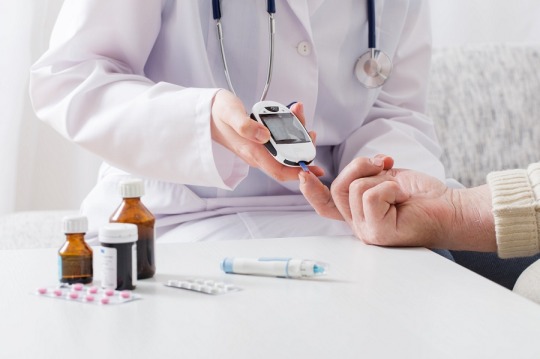
Introduction:
In the dynamic landscape of modern medicine, the importance of specialized training cannot be overstated, especially in fields as critical as diabetes management. For medical professionals seeking to deepen their understanding and hone their skills in this area, pursuing a fellowship in diabetes mellitus presents a promising avenue for growth and specialization. In recent years, the availability of online fellowship programs has democratized access to advanced medical education, offering flexibility and convenience without compromising on quality. This article delves into the significance of pursuing a fellowship in diabetes management online after completing MBBS, exploring its benefits, curriculum, and impact on medical practice.
Importance of Diabetes Management Fellowship:
Diabetes mellitus is a global health concern, with its prevalence steadily rising worldwide. Effective management of diabetes requires a comprehensive understanding of its pathophysiology, treatment modalities, and preventive strategies. While undergraduate medical education provides a solid foundation in general medicine, it often lacks the depth needed to address the complexities of chronic conditions like diabetes. A fellowship in diabetes management serves as a specialized training program designed to bridge this gap, equipping healthcare professionals with the knowledge and skills necessary to deliver optimal care to patients with diabetes.
Benefits of Online Fellowship Programs:
The emergence of online education has revolutionized the way medical professionals pursue further training. Online fellowship programs in diabetes management offer numerous benefits, including flexibility in scheduling, accessibility from anywhere with an internet connection, and the ability to balance professional commitments with academic pursuits. Moreover, online platforms often leverage multimedia resources, interactive modules, and virtual patient simulations to enhance learning experiences, allowing participants to apply theoretical knowledge to real-world scenarios effectively.
Curriculum Overview:
A typical fellowship in diabetes management curriculum covers a broad spectrum of topics, including but not limited to:
Pathophysiology of Diabetes Mellitus: Understanding the underlying mechanisms of type 1, type 2, and gestational diabetes mellitus.
Diagnostic Approaches: Mastery of diagnostic criteria, interpretation of laboratory tests, and utilization of imaging modalities in diabetes diagnosis.
Pharmacological Management: In-depth knowledge of insulin therapy, oral hypoglycemic agents, injectable medications, and emerging treatment modalities.
Lifestyle Interventions: Strategies for dietary modification, exercise prescription, and behavioral counseling to optimize glycemic control and prevent complications.
Complications Management: Recognition, prevention, and management of acute and chronic complications associated with diabetes, such as diabetic ketoacidosis, neuropathy, retinopathy, and nephropathy.
Patient-Centered Care: Effective communication skills, patient education techniques, and shared decision-making principles to empower individuals living with diabetes and promote adherence to treatment plans.
Research and Innovation: Critical appraisal of current literature, participation in clinical trials, and integration of evidence-based practices into clinical care.
Impact on Medical Practice:
Completing a fellowship in diabetes management online after MBBS can profoundly impact medical practice in several ways:
Enhanced Clinical Competence: Participants develop advanced clinical skills and confidence in managing complex cases of diabetes, leading to improved patient outcomes.
Interdisciplinary Collaboration: Collaborative opportunities with endocrinologists, dietitians, diabetes educators, and other allied health professionals foster a multidisciplinary approach to diabetes care, promoting holistic patient management.
Continuous Professional Development: Lifelong learning is essential in medicine, and fellowship programs provide a platform for ongoing skill development and knowledge acquisition in the rapidly evolving field of diabetes management.
Leadership and Advocacy: Graduates of diabetes management fellowships are well-positioned to assume leadership roles in healthcare organizations, advocate for policy changes, and drive initiatives aimed at improving diabetes care at the community and population levels.
Conclusion:
In conclusion, pursuing a fellowship in diabetes mellitus online after MBBS offers a valuable opportunity for medical professionals to deepen their expertise, expand their clinical acumen, and make a meaningful impact in the lives of patients living with diabetes. By embracing the flexibility and accessibility of online education, healthcare providers can embark on a journey of lifelong learning and professional growth, ultimately contributing to the advancement of diabetes care on a global scale.
#fellowship in diabetology#fellowship in diabetes#fellowship in diabetes mellitus#diabetes fellowship online#diabetes fellowship courses#fellowship in diabetology online
0 notes
Text
Managing Diabetes in Adolescents: A Complex Interplay of Physiology and Psychosocial Factors

Introduction
A fellowship in Diabetes Mellitus by Medvantage helps understand how Diabetes in adolescence, marked by dynamic physiological changes and intricate psychosocial development, presents a unique set of challenges for individuals grappling with diabetes. Whether dealing with type 1 or type 2 diabetes, the delicate balance of hormonal fluctuations and lifestyle adjustments during this period requires meticulous medical management and a nuanced understanding of the psychological impact on adolescents.
Physiological Challenges
Adolescence is characterized by growth spurts and hormonal fluctuations, both of which can influence insulin sensitivity. In diabetes, this heightened insulin resistance demands vigilant monitoring and adjustment of insulin doses. The intricacies of managing blood glucose levels become more pronounced, necessitating personalized care plans that account for the individualized responses to physiological changes during adolescence.
Moreover, the emergence of insulin resistance can complicate the delicate equilibrium in glucose regulation, reinforcing the importance of a comprehensive approach to diabetes management. Dietary habits and physical activity, often erratic during adolescence, contribute to the complexity of glycemic control.
Psychosocial Impacts
The psychosocial aspect of diabetes in adolescence is equally pivotal. The quest for autonomy and independence clashes with the demanding nature of diabetes management, potentially leading to emotional distress. Adolescents may grapple with feelings of frustration, isolation, and even defiance in their efforts to assert independence while adhering to strict medical routines.
Social dynamics play a substantial role, with adolescents fearing stigmatization and struggling to strike a balance between fitting in and adhering to health guidelines. Peer support, alongside transparent communication with healthcare providers, plays a crucial role in addressing these psychosocial challenges. That’s why doing fellowship in diabetology after MBBS is one of the most prominent course one can do.
Educational Strategies by doing Fellowship in Diabetes Mellitus
Empowering adolescents to manage their diabetes involves providing comprehensive education that encompasses both medical and psychosocial aspects. Diabetes education programs, integrated into both school curricula and healthcare settings, can offer valuable resources. Teaching self-monitoring techniques, insulin management, and coping mechanisms equips adolescents with the knowledge and skills essential for autonomous diabetes care.
Healthcare professionals should actively engage adolescents in their care, fostering an open dialogue to address concerns and dispel misconceptions. Emphasizing the importance of adhering to medical recommendations while providing practical strategies for navigating social situations can contribute to improved diabetes management in this age group.
Conclusion
Fellowship in Diabetology by Medvantage helps to teach how to effectively manage diabetes in adolescence by using approach that recognizes the intricate interplay between physiological changes and psychosocial factors. By tailoring medical interventions to the unique needs of adolescents and fostering a supportive environment that encourages communication and education, healthcare professionals can empower young individuals to navigate the complexities of diabetes during this critical phase of development.
#medvantage#fellowship in diabetes mellitus#diabetes mellitus#Fellowship in diabetology after mbbs#Fellowship Course in Diabetes Mellitus#Fellowship in diabetology#Fellowship in diabetes after mbbs#Fellowship in diabetes in india#Online fellowship courses#Online fellowship in diabetology#Online fellowship in diabetes mellitus#Diabetology course after mbbs
0 notes
Text
🩺 How to Choose the Best Online Medical Course in India

So, you're looking to pursue an online medical course in India? Smart move. With the medical field evolving at lightning speed and the digital revolution transforming education, online learning has become a go-to for students and professionals alike. Especially after the COVID-19 pandemic, the way we learn—especially in medicine—has changed forever. But here's the catch: not all courses are made equal. So, how do you pick the one that's truly worth your time and money? Let's break it down.
Understanding Your Goals
Before diving into the ocean of options, let’s get one thing straight: why are you doing this?
Are you preparing for a competitive exam?
If you're aiming for NEET PG, INI-CET, or any other competitive exam, you need a course focused on entrance prep. Look for mock tests, clinical case discussions, and MCQ banks.
Looking to upgrade your knowledge as a medical professional?
For working doctors or paramedics, a course that provides CME (Continuing Medical Education) credits, updated clinical knowledge, and real-world cases is more suitable.
Seeking specialization or a certificate?
Want to specialize in diabetology, radiology, or hospital management? Many online platforms offer certified diploma or fellowship programs. Know what you want.
Accreditation and Recognition
You wouldn’t buy a fake stethoscope, right? So don’t invest in a course without checking if it’s legit.
Is the course approved by a reputable body?
Always check if the course is accredited by medical councils like NMC, NABH, or even WHO-certified institutions.
Why accreditation matters for future prospects
An unaccredited course may mean your certificate won’t be accepted by employers or regulators. It could literally be a waste of time.
Course Content and Curriculum
A course is only as good as its content.
Relevance to your career goals
A pathologist doesn’t need a deep dive into orthopedic procedures. Choose a course that aligns with your field.
Depth and breadth of the syllabus
Does it cover both theory and clinical application? Are real case studies included?
Updated content with latest medical advancements
Medicine evolves. Your course should too. Check if the curriculum includes the latest research, guidelines, and diagnostic technologies.
Faculty and Instructors
Would you rather learn from a top surgeon or someone who just reads off slides?
Background and experience of instructors
Google your instructors. Do they have real-world experience? Published papers? Awards?
Are they active practitioners or academicians?
Practitioners bring clinical insights. Academicians bring deep knowledge. The best courses offer both.
Access to mentorship
Can you connect with faculty for guidance, or is it a one-way street?
Platform and Learning Experience
Let’s face it: no one wants to struggle with a buggy website.
User-friendly interface
An intuitive dashboard, organized modules, and easy navigation can make a huge difference.
Mobile compatibility and app support
You’re probably learning on the go. A good app with offline mode is a big win.
Interactive modules and downloadable resources
Videos, quizzes, PDFs—variety keeps things interesting and helps retention.
Flexibility and Schedule
Your time is precious.
Self-paced vs. fixed schedule
Can you learn on your own time, or are you tied to live classes?
Live classes or recorded sessions?
Some platforms offer hybrid models. Recorded sessions are great for review. Live classes help with interaction.
Assessment and Certification
How do you know you’re actually learning?
Are there periodic tests?
Regular assessments help you track your progress and keep you motivated.
Is the certification recognized globally?
If you’re planning to work abroad, ensure the course certificate holds international value.
Cost and Value for Money
Money talks—but it shouldn’t scream.
Free vs. paid courses
Free is great, but paid courses often offer structured learning, mentorship, and real credentials.
EMI or installment options
Many platforms offer easy payment plans. Don’t break the bank at once.
Are there scholarships or discounts?
Keep an eye out for seasonal discounts, referral bonuses, or student pricing.
Checkout different courses below:
Radiology Courses
Cardiology Courses
Internal Medicine Courses
Obstetrics and Gynecology Courses
Critical Care Medicine Courses
Emergency Medicine Courses
Paediatrics Courses
Embryology Courses
Oncology Courses
Cosmetology Courses
Clinical Cardiology Courses
Clinical Embryology Courses
Neurology Courses
Echocardiography Courses
Endocrinology Courses
Diabetology Courses
Reviews and Testimonials
Trust the word on the street—or better yet, online.
Checking student feedback
Genuine reviews on platforms like Quora, Reddit, and YouTube can give you the real picture.
Trustworthy review platforms
Stick to verified platforms—no paid reviews or shady testimonials.
Support and Assistance
You’re bound to have questions.
Doubt-clearing sessions
Do they offer live Q&A or chat-based doubt resolution?
Technical and academic support
You don’t want to get stuck because a video won’t load or your test didn’t submit.
Trial Classes or Demo Access
Test before you invest.
Importance of a test run before enrolling
Most good platforms offer demo access. Try it. If it clicks, go for it.
Industry Partnerships and Placement Support
Looking to climb the career ladder?
Collaborations with hospitals or clinics
These add credibility and sometimes lead to real job opportunities.
Internship or job opportunities
Some courses offer placement help. That’s a huge bonus.
Popular Platforms Offering Online Medical Courses in India
Here are a few trusted names to get you started:
Medvarsity – Offers various diploma and fellowship programs.
Marrow – Ideal for NEET PG prep.
Unacademy – Offers a wide variety of prep materials.
Coursera & edX – International platforms with global university tie-ups.
DailyRounds – Clinical-based app for practicing doctors.
Conclusion
Choosing the right online medical course in India can feel overwhelming, but it doesn't have to be. Start with your goals, do your research, and remember—this is an investment in your future. A well-chosen course can sharpen your skills, boost your resume, and open doors you didn’t know existed. So go ahead, pick smart, and start learning. The future of medicine is digital, and you're already on the right track.
FAQs
1. What is the best online medical course for NEET PG in India? Marrow, Unacademy, and Prepladder are considered top choices for NEET PG aspirants due to their comprehensive MCQ banks and video lectures.
2. Are online medical courses in India valid for government jobs? It depends. Certification or diploma courses recognized by government bodies or approved institutions are usually valid.
3. Can I do an MBBS online in India? No, MBBS is a professional degree that requires practical training and cannot be completed entirely online.
4. Is it possible to practice medicine after an online course? Only if the course is part of your medical education. Short-term courses can't qualify you to practice independently.
5. Which online platform offers the most affordable medical courses? Platforms like Medvarsity and Coursera offer affordable options, and sometimes even free audit versions of courses.
0 notes
Text
Why MBBS Doctors & Other Healthcare Professionals Should Choose the Online Fellowship Program with MedJoin Global Healthcare

In today’s rapidly evolving healthcare landscape, the need for continuous upskilling and specialization is more important than ever. With medical science advancing at an unprecedented pace and patient expectations rising alongside technological innovations, healthcare professionals are expected not only to stay informed but to lead with expertise, confidence, and adaptability.
MedJoin Global Healthcare stands at the forefront of this transformation, offering cutting-edge online Fellowship Programs specifically designed for MBBS doctors and allied healthcare professionals. Whether you're an early-career practitioner, a seasoned specialist, or a healthcare leader seeking to sharpen your edge, MedJoin offers an ideal platform to elevate your career and global standing.
Here’s why joining MedJoin’s Online Fellowship Program is one of the best decisions you can make for your medical career.
1. Global Recognition & Certification
One of the primary benefits of the MedJoin Online Fellowship is the globally recognized certification it offers. MedJoin collaborates with top-tier medical institutions, universities, and healthcare organizations to ensure its curriculum meets international standards.
This means that upon completion, not only will you enhance your credibility within your local medical community, but you’ll also gain recognition that opens doors across borders — from the Middle East and Europe to Southeast Asia, the Americas, and beyond.
Why this matters:
Enhances your CV with an internationally acclaimed credential.
Expands career opportunities globally.
Builds trust among peers and patients.
2. Flexible & Self-Paced Learning – Designed for Working Professionals
MedJoin understands the demanding schedules of healthcare professionals. Long shifts, night duties, emergency calls, and patient responsibilities can make traditional learning nearly impossible. That’s why their Fellowship Programs are fully online, modular, and self-paced.
You can access course materials, video lectures, case studies, and interactive sessions from anywhere, at any time. Whether you're taking a break between patients or relaxing at home after a long day, learning is always within reach.
Why this matters:
No need to take a break from your clinical practice.
Learn at your own pace — daily, weekly, or whenever you’re free.
Accessible 24/7 from any device — laptop, tablet, or smartphone.
3. Specialized Programs Tailored for Real-World Practice
MedJoin offers a wide array of fellowship programs across multiple specializations such as:
Cardiology
Diabetology
Critical Care
Emergency Medicine
Radiology
Oncology
Dermatology
Mental Health & Psychiatry
Obstetrics & Gynecology
Medical Imaging & Diagnostics
Family Medicine
And many more...
Each course is meticulously designed by subject-matter experts and practicing clinicians to ensure that what you learn can be applied immediately in your clinical settings. The blend of theory, clinical exposure (virtual or through affiliated hospitals), and case-based discussions ensures deep, practical understanding.
Why this matters:
Bridges the gap between theory and practice.
Prepares you for complex, real-life medical scenarios.
Lets you choose a specialization that aligns with your passion or practice area.
4. Affordable & Value-Packed Investment in Your Career
Unlike many global certification programs that come with hefty tuition fees and relocation costs, MedJoin offers an affordable path to excellence. With flexible payment options, scholarships, and early-bird discounts, MedJoin ensures that quality education is accessible to all healthcare professionals, regardless of location or financial background.
Why this matters:
High ROI: Minimal cost for a globally recognized credential.
No travel, accommodation, or time-off expenses.
Easy EMI & payment plans available.
5. Mentorship from Global Medical Experts
MedJoin connects you with renowned clinicians, surgeons, researchers, and academic professionals from around the world. Through live webinars, interactive Q&A sessions, and mentorship opportunities, you gain insights from the best minds in the industry.
This is not just passive learning; it’s a dynamic environment where you can ask questions, present cases, and receive feedback that sharpens your clinical acumen and decision-making skills.
Why this matters:
Access to top mentors you wouldn't usually meet.
Real-time learning and feedback.
Builds your professional network beyond borders.
6. Career Advancement & Promotions
Whether you're aiming for a hospital leadership role, a teaching position, or an international job opportunity, a fellowship from MedJoin gives you a competitive edge. Many alumni report securing better positions, getting shortlisted for jobs abroad, or being promoted within their current hospitals.
For MBBS doctors, especially, who are exploring postgraduate equivalency, overseas migration, or clinical upgrades, these fellowships serve as stepping stones.
Why this matters:
Boosts your profile for job interviews and licensing boards.
Enhances your eligibility for international healthcare roles.
Opens doors to clinical research and academic collaborations.
7. Cutting-Edge Curriculum with Tech Integration
MedJoin’s online platform is powered by the latest ed-tech tools and learning management systems. Expect an immersive experience with:
Interactive quizzes and simulations
High-quality 3D anatomy models
Virtual patient case simulations
Recorded surgeries and diagnostic walkthroughs
AI-driven assessments and progress tracking
Why this matters:
Learning becomes engaging and effective.
Helps you retain complex concepts longer.
Offers hands-on feel in a digital format.
8. Continuous Medical Education (CME) Credits
Many of MedJoin’s Fellowship Programs are eligible for CME credits, helping you maintain your medical license while advancing your education. This dual benefit makes it easier to stay compliant with national and international medical councils.
Why this matters:
Keeps your license active and compliant.
Fulfills mandatory CME requirements in your country.
Proves commitment to professional development.
9. Strong Alumni Network & Peer Support
MedJoin is not just a learning platform — it’s a global community. Graduates automatically become part of a vibrant alumni network of doctors, nurses, and healthcare workers across the globe.
From collaborative projects and research to job referrals and second opinions, the MedJoin community provides ongoing support and camaraderie throughout your career.
Why this matters:
Networking with like-minded professionals.
Opportunities for collaboration and clinical exchange.
Life-long learning and peer mentorship.
10. Future-Ready: Be Ahead in a Competitive Field
Medicine is changing. Telehealth, AI, personalized medicine, and patient-centric care are revolutionizing the way doctors work. MedJoin’s courses are future-forward, equipping you with not just clinical knowledge but also digital competencies, leadership skills, and an understanding of healthcare trends.
Why this matters:
Be prepared for the future of medicine.
Add digital and leadership skills to your clinical profile.
Stay relevant and resilient in a fast-changing industry.
Who Should Enroll?
MedJoin’s Fellowship Program is ideal for:
MBBS Graduates looking to upskill without doing a full-time residency
General Practitioners seeking specialization
Nursing Professionals and Physician Assistants
Healthcare Administrators aiming to add clinical expertise
International Medical Graduates (IMGs) preparing for global practice
Postgraduates looking to add a sub-specialty
Whether you're from India, the Gulf, Africa, Southeast Asia, or the West, MedJoin is your gateway to professional excellence.
Final Thoughts: Your Career, Your Legacy
Being a great healthcare professional in the 21st century means more than just treating patients. It’s about embracing lifelong learning, adapting to change, and continuously striving for better outcomes. MedJoin Global Healthcare provides you with the tools, mentorship, and credibility to thrive in this new era.
So, if you're an MBBS doctor or healthcare professional wondering what’s next, the answer might be just a click away.
Take the step. Advance your skills. Join the MedJoin Fellowship Program today — and become the doctor the future demands.
For Enrollment & More Information: 🌐 Visit: www.medjoinhealthcare.in
📧 Email: [email protected]
📞 WhatsApp/Call: +91-6370182504
🔗 [Follow on LinkedIn | Instagram | Facebook | YouTube | Twitter | Pinterest]
#MedJoin#Fellowship program#Fellowship Course after MBBS#Online Fellowship Program#fellowship course
0 notes
Text
Advanced Certificate Course in Diabetes Mellitus
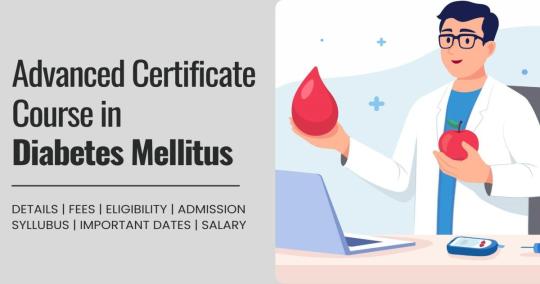
Advanced Certificate Course in Diabetes Mellitus program focus on clinical knowledge and training for medical graduates into Diabetology. It is suitable for General Physicians, Registered Medical Officer, Junior Resident, Medicine Resident Doctors. The program duration is varies between 6 months to 1 year as per the course syllabus and institute criteria.Readmore
1 note
·
View note
Text
Discover the finest MCI-approved Diabetology courses in India with our ultimate guide. Explore Delhi Medical Health Care Academy's accredited programs for expert training in Diabetology and take your medical career to new heights.
#MCI-approved Diabetology courses#Delhi Medical Health Care Academy'#MCI-approved Diabetology courses in India#Diabetology courses
0 notes
Text
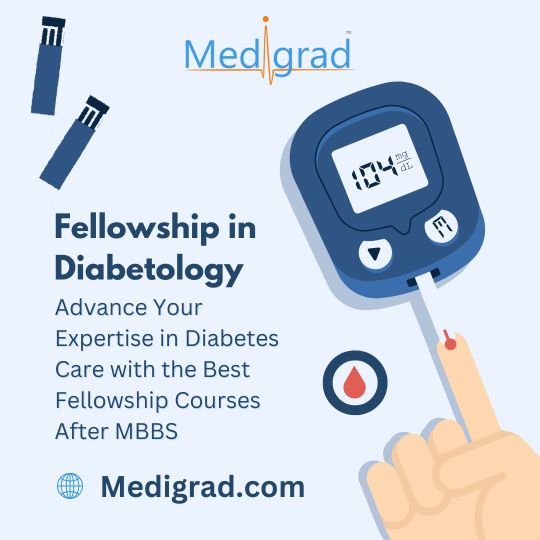
Fellowship in Diabetology | Advance Your Expertise in Diabetes Care – Medigrad
Advance your expertise in diabetes care with Medigrad’s Fellowship in Diabetology, one of the best fellowship courses after MBBS. Gain specialized knowledge, hands-on training, and a recognized certification to enhance your medical career. Enroll today! Looking for the best fellowship courses after MBBS? Medigrad’s Fellowship in Diabetology offers expert training in diabetes management with hands-on experience and certification. Boost your career—Apply now!
0 notes
Text
Top Challenges for New Diabetology Fellows
Fellowship in Diabetology: Advancing Global Diabetes Management
The Fellowship in Diabetology, offered by Virtued Academy International in collaboration with the International Association of Therapists (IAOTH), UK, is a groundbreaking program designed to empower healthcare professionals with specialized knowledge and skills in diabetes management. Fellowship in Diabetology As diabetes continues to pose a significant challenge to global health, this fellowship aims to equip practitioners with the tools necessary to address this epidemic effectively.
Program Overview
The Fellowship in Diabetology is a comprehensive program that combines theoretical knowledge with practical applications. It is tailored for healthcare professionals, including doctors, nurses, dietitians, and other allied health practitioners, Diabetes Management Course who seek to deepen their understanding of diabetes and enhance their clinical expertise. The program covers the latest advancements in diabetes research, diagnosis, treatment, and prevention strategies.
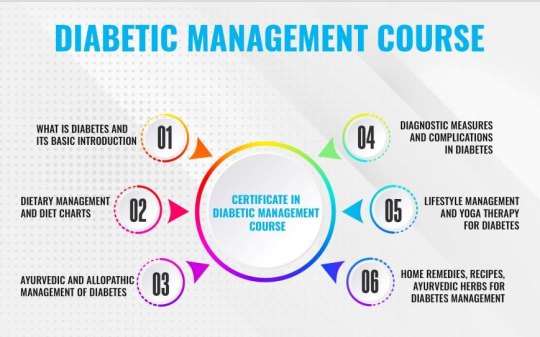
Key Features of the Program
Collaborative Excellence: The fellowship is a joint initiative by Virtued Academy International and the IAOTH, UK, ensuring global standards of education and certification.
Comprehensive Curriculum: The program encompasses a wide range of topics, including:
Pathophysiology and types of diabetes
Latest diagnostic tools and techniques
Advanced pharmacological and non-pharmacological treatments
Lifestyle interventions, including nutrition and physical activity
Diabetes-related complications and their management
Patient education and psychological support
Practical Training: Participants engage in hands-on training, case studies, and real-world scenarios to apply their knowledge effectively.
Global Recognition: Graduates of the program receive a certification recognized internationally, enhancing their professional credibility and career prospects.
Flexible Learning: The fellowship offers both online and offline learning options, allowing participants to balance their professional commitments while pursuing the program.
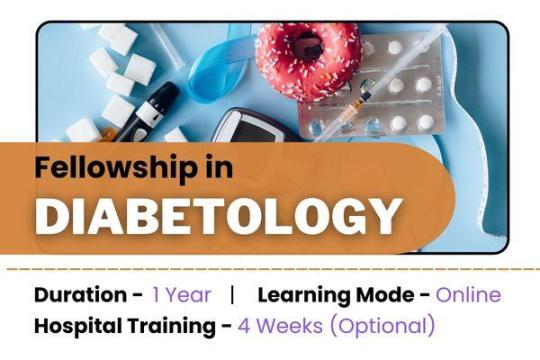
Program Modules
The fellowship is structured into several well-defined modules, ensuring a step-by-step approach to mastering diabetology:
Fundamentals of Diabetes: Covering the basics of diabetes, including its types, causes, and epidemiology.
Diagnostics in Diabetes: Understanding laboratory tests, glucose monitoring, and innovative diagnostic tools.
Treatment Modalities: Analyzing pharmacological therapies such as insulin, oral hypoglycemic agents, and emerging treatment options.
Lifestyle and Nutrition: Emphasizing the role of diet, exercise, and lifestyle changes in managing and preventing diabetes.
Special Populations: Addressing diabetes care in children, pregnant women, and the elderly.
Complication Management: Exploring strategies for managing complications such as neuropathy, nephropathy, and retinopathy.
Patient-Centered Care: Focusing on communication, counseling, and psychological support for patients.
Why Choose This Fellowship?
Addressing a Global Challenge: With over 537 million adults living with diabetes worldwide (as of recent data), the need for skilled professionals in diabetes management is more critical than ever.
Expert Faculty: Learn from leading experts and practitioners in the field of diabetology, gaining insights into cutting-edge practices and research.
Career Advancement: Enhance your credentials and open doors to new opportunities in clinical practice, research, and education.
Holistic Approach: The program emphasizes a patient-centered approach, integrating medical, psychological, and lifestyle aspects to ensure comprehensive care.
Research Opportunities: Participants are encouraged to engage in research projects and contribute to the growing body of knowledge in diabetes management.
Networking: Join a global community of healthcare professionals, fostering collaboration and sharing best practices in diabetology.
Testimonials from Graduates
Participants of the Fellowship in Diabetology have shared their experiences:
"This program transformed my approach to diabetes care. The practical insights and case studies were invaluable."
"I feel more confident in managing complex diabetes cases, thanks to the expert faculty and comprehensive curriculum."
"The flexibility of online learning allowed me to pursue the fellowship without interrupting my practice."
Future Prospects
Graduates of the fellowship can explore a variety of career paths, including:
Specialist roles in diabetes clinics and hospitals
Diabetes education and counseling
Research and academic positions
Leadership roles in public health initiatives focused on diabetes prevention and care
How to Enroll
Enrollment in the Fellowship in Diabetology is straightforward. Interested candidates can visit the Virtued Academy International website to learn more about eligibility criteria, program fees, and the application process. Early registration is recommended due to the limited number of seats.
Conclusion
The Fellowship in Diabetology offered by Virtued Academy International in collaboration with the IAOTH, UK, represents a significant step forward in combating the diabetes epidemic. By equipping healthcare professionals with advanced knowledge and skills, this program not only enhances individual careers but also contributes to improving global health outcomes. Enroll today to become a leader in the fight against diabetes and make a lasting impact in the field of healthcare.
0 notes
Text
Mastering the Path to Becoming a Diabetes Doctor: A Comprehensive Guide
Becoming a diabetes doctor is a noble pursuit, one that requires dedication, perseverance, and a deep understanding of the complexities of this chronic condition. At the heart of this journey lies a commitment to making a difference in the lives of those affected by diabetes, whether through patient care, research, or education. In this comprehensive guide, we delve into the essential steps and considerations on the path to becoming a proficient and respected diabetes doctor.
Understanding the Landscape of Diabetes
Before embarking on the journey to become a diabetes doctor, it's crucial to gain a solid understanding of the condition itself. Diabetes is a metabolic disorder characterized by elevated blood sugar levels, resulting from either inadequate insulin production or the body's inability to effectively use insulin. This condition can lead to a host of complications, including cardiovascular disease, kidney failure, and nerve damage.
Academic Foundations: Education and Training
The journey to becoming a diabetes doctor begins with a strong academic foundation. Prospective physicians typically pursue a bachelor's degree in a relevant field, such as biology, chemistry, or biochemistry, before gaining acceptance to medical school. Once enrolled, medical students undergo rigorous training in various medical disciplines, including internal medicine, endocrinology, and diabetes management.
Specialization in Diabetes Care
Aspiring diabetes doctors have the opportunity to specialize in the field of diabetology, focusing specifically on the prevention, diagnosis, and treatment of diabetes and its complications. This specialization involves additional training and education beyond medical school, often through residency programs and fellowships in diabetes and endocrinology.
Clinical Experience: Patient Care and Management
Central to the role of a diabetes doctor is the provision of comprehensive and compassionate care to patients living with diabetes. Clinical experience plays a vital role in honing diagnostic skills, refining treatment strategies, and fostering meaningful patient-provider relationships. Through hands-on experience in outpatient clinics, inpatient wards, and specialty clinics, diabetes doctors develop the expertise necessary to address the diverse needs of their patients effectively.
Research and Innovation
In addition to clinical practice, diabetes doctors have the opportunity to contribute to the advancement of knowledge in the field through research and innovation. Whether conducting clinical trials, exploring novel treatment modalities, or investigating the underlying mechanisms of diabetes, research endeavors play a crucial role in improving patient outcomes and shaping the future of diabetes care.
Continuing Education and Professional Development
The journey to becoming a proficient diabetes doctor is ongoing, marked by a commitment to lifelong learning and professional development. Through participation in conferences, seminars, and continuing medical education courses, diabetes doctors stay abreast of the latest advancements in the field and enhance their clinical skills and knowledge base.
Advocacy and Public Health Initiatives
Beyond clinical practice and research, diabetes doctors have a unique opportunity to advocate for policies and initiatives aimed at preventing and managing diabetes on a broader scale. Whether through involvement in public health campaigns, community outreach programs, or legislative advocacy efforts, diabetes doctors can make a significant impact in addressing the growing burden of diabetes worldwide.
Conclusion
Becoming a diabetes doctor is a multifaceted journey that requires dedication, expertise, and a genuine commitment to improving the lives of individuals affected by diabetes. By pursuing a rigorous academic path, gaining clinical experience, engaging in research endeavors, and embracing opportunities for lifelong learning and advocacy, aspiring diabetes doctors can truly make a difference in the fight against this chronic condition.
#DiabetesDoctor#DiabetesCare#DiabetesSpecialist#Diabetology#Endocrinology#MedicalEducation#ClinicalExperience#ResearchInDiabetes#ProfessionalDevelopment#PublicHealth#Advocacy#LifelongLearning#MedicalSpecialization#Healthcare#MedicalResearch#PatientCare#ChronicConditions#HealthAdvocacy#MedicalTraining#HealthcareProfessionals
1 note
·
View note
Text
Exploring the Significance of Fellowship in Diabetes Management

Introduction:
In today's healthcare landscape, the prevalence of diabetes continues to rise, posing significant challenges to healthcare professionals worldwide. As the demand for specialized care in diabetes management escalates, the need for well-trained professionals in diabetology becomes increasingly crucial. Recognizing this necessity, fellowship programs in diabetes management have emerged as pivotal avenues for healthcare practitioners to acquire advanced knowledge and skills in effectively managing this complex chronic condition. In recent years, the advent of online education has revolutionized learning opportunities, making fellowship programs in diabetology more accessible to healthcare professionals globally.Understanding the Importance of Fellowship in Diabetes Management:
A fellowship in diabetes management serves as a cornerstone for healthcare professionals seeking to enhance their expertise in effectively managing diabetes. These specialized programs delve deep into various aspects of diabetes care, including diagnosis, treatment, lifestyle interventions, patient education, and prevention strategies. Through comprehensive curriculum and hands-on training, fellows gain invaluable insights into the intricacies of diabetes management, enabling them to deliver optimal care to patients with diabetes.Key Components of Fellowship in Diabetology:
Fellowship programs in diabetology typically encompass a diverse array of educational components designed to equip participants with comprehensive knowledge and practical skills. These components may include:
Core Curriculum: A structured curriculum covering essential topics such as pathophysiology of diabetes, pharmacotherapy, dietary management, exercise protocols, monitoring techniques, and complications management forms the foundation of the fellowship program.
Clinical Rotations: Hands-on clinical experience is a vital aspect of fellowship training, allowing participants to apply theoretical knowledge in real-world settings. Clinical rotations may take place in various healthcare settings, including outpatient clinics, hospitals, and specialty diabetes centers.
Interdisciplinary Collaboration: Collaborative learning opportunities with multidisciplinary healthcare teams facilitate a holistic approach to diabetes management. Fellows interact with endocrinologists, dietitians, nurses, psychologists, and other healthcare professionals to gain insights into comprehensive patient care.
Research and Scholarly Activities: Engaging in research projects, case studies, and scholarly activities fosters critical thinking and evidence-based practice among fellows. These activities contribute to advancing the field of diabetology and enhancing patient outcomes.
Continuing Education: Lifelong learning is integral to staying abreast of advancements in diabetes care. Fellowship programs often provide access to continuing education resources, conferences, and workshops to support ongoing professional development.The Rise of Online Fellowship Programs in Diabetology:
With the increasing demand for flexible and accessible education options, online fellowship programs in diabetology have gained prominence. These programs leverage digital platforms to deliver high-quality education to healthcare professionals regardless of geographical location or scheduling constraints. Online fellowship programs offer several advantages, including:
Flexibility: Online programs allow participants to balance their professional and personal commitments while pursuing advanced education in diabetology. The flexibility of online learning enables healthcare professionals to access course materials and lectures at their convenience, eliminating the need for rigid schedules.
Accessibility: Online fellowship programs transcend geographical barriers, enabling healthcare professionals from diverse backgrounds to enroll without the constraints of location or travel. This accessibility promotes inclusivity and diversity within the diabetology workforce.
Interactive Learning: Through virtual classrooms, discussion forums, and multimedia resources, online fellowship programs foster interactive and engaging learning experiences. Participants can collaborate with peers, interact with expert faculty, and participate in case-based discussions, enhancing their understanding of diabetes management principles.
Self-Paced Learning: Online programs often offer self-paced learning modules, allowing participants to progress through the curriculum at their preferred speed. This flexibility accommodates varying learning styles and preferences, empowering participants to tailor their educational experience to suit their needs.
Cost-Effectiveness: Online fellowship programs typically incur lower costs compared to traditional on-campus programs, as they eliminate expenses associated with travel, accommodation, and campus fees. This affordability makes advanced education in diabetology more accessible to a broader range of healthcare professionals.Challenges and Considerations:
While online fellowship programs in diabetology offer numerous benefits, they also present certain challenges and considerations. These include:
Technological Requirements: Participants must have access to reliable internet connectivity and appropriate technology devices to engage effectively in online learning activities.
Self-Motivation and Discipline: Online learning requires self-motivation and discipline to stay on track with coursework and assignments, particularly for individuals balancing professional responsibilities with education.
Quality Assurance: Ensuring the quality and credibility of online fellowship programs is essential. Participants should thoroughly research accreditation, faculty credentials, and program outcomes before enrolling in any online diabetology program.
Clinical Training Opportunities: While online programs provide comprehensive didactic education, hands-on clinical training may be limited. Participants should seek opportunities for clinical rotations and practical experience to complement their online learning.Conclusion:
In conclusion, fellowship programs in diabetes management play a pivotal role in preparing healthcare professionals to address the growing challenges posed by diabetes worldwide. The advent of online education has transformed the landscape of diabetology education, offering flexible and accessible learning opportunities for healthcare professionals seeking to advance their expertise in diabetes management. By embracing online fellowship programs, healthcare professionals can enhance their knowledge, skills, and confidence in effectively managing diabetes, ultimately improving patient outcomes and contributing to the global fight against this pervasive chronic condition.
#fellowship in diabetology#fellowship in diabetes#fellowship in diabetes mellitus#diabetes fellowship online#diabetes fellowship courses#fellowship in diabetology online
0 notes
Text
Unmasking the Global Diabetes Epidemic: Understanding the dangers of “The Sweet Tooth"
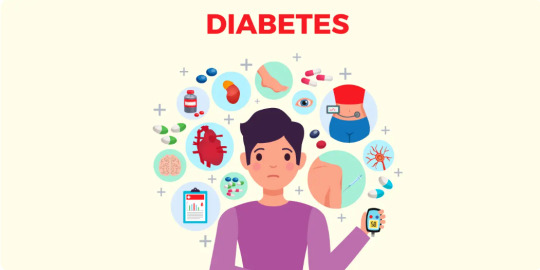
EPIDEMIOLOGY OF DIABETES MELLITUS
Diabetes mellitus is a clinical syndrome with many causes, which is characterized by the presence of hyperglycemia (mellitus being Latin for ‘sweet’). Type 2 diabetes accounts for around 90% of cases, while type 1 diabetes accounts for most of the remainder. All types of diabetes is consequences of relatively or absolute insulin deficiency. Therefore, a Fellowship in Diabetes Mellitus is considered one of the most relevant fellowships around the world.
Together both the diabetes type 1 and type 2 are holding similar hyperglycemic complications but their etiology and pathophysiology are different.
In type 1 diabetes, there is an absolute deficiency of insulin because of an immune-mediated destruction of insulin-producing β cells in the pancreatic islets of Langerhans.
Contrast, in type 2 diabetes, concentrations of circulating insulin are typically elevated, but there is a relative deficiency of insulin because there is reduced sensitivity to insulin in peripheral tissues (because of obesity) and the β cells cannot make ample insulin to overcome this ‘insulin resistance’.
PREVALENCE AND DEATH RATE
Diabetes carries a heavy personal burden for those affected as well as high financial costs to health-care systems and society at large scale.
In year 2017, diabetes causes 4 Million death globally and healthcare expenditure of diabetes was calculated globally around to be 60,51,51,16,500 Indian rupees or 10% of total healthcare expenditure.
The prevalence of diabetes is rising. Globally, it is estimated that 463 million people had diabetes in 2019 (9.3% of the world adult population), approximately 90% with type 2 diabetes. This figure is expected to reach700 million by 2045.
Prevalence is highest in middle eastern and low eastern parts of Africa and varying around the world. According to ethnicity and environmental factors (obesity, diet, low - habitual physical activity, urbanisation and economic development).
A pronounced rise in the prevalence of type 2 diabetes occurs in migrant populations from low-income to industrialized countries. In many high-income countries, type 2 diabetes is no longer rare in children and adolescents, particularly in people of South Asian countries because of these countries, increased survival is a factor underlying rising prevalence.
Type 1 diabetes is also subject to geographical variation and is generally more prevalent in countries closer to the polar regions. Finland for instance, has the highest rate of type 1 diagnosis per year at >60 per 100 000 of the population, whereas in China and Venezuela the incidence is only 0.1 per 100 000. The incidence of type 1 diabetes is also increasing: between 1989 and 2013, 3.4 % more children were diagnosed worldwide each year. Type 1 diabetes is more common inpeople of European descent than in other ethnic groups and, for reasons that are not understood, more people are diagnosed in the winter months more as compare to others.
MICRO AND MACRO VASCULAR COMPLICATION
Microvascular complications:
In Eyes leads to Retinopathy, Cataract ultimately to glaucoma.
In Kidneys due to high blood glucose leads to high blood pressure and affecting nephrons leading to nephropathy.
In Nerves hyperglycemia damages peripheral nerves system this will results in pain and numbness. Feet wounds will go undetected and will left untreated ultimately leading to gangrene.
Macrovascular complications:
In Brain there will be increased risk of stroke and cerebrovascular disease including transient ischemic attacks, cognitive impairment etc.
In Heart due to high blood pressure and insulin resistance there is increased risk of heart-attacks and coronary heart disease.
In Extremities peripheral narrowing of blood vessels will leads to peripheral neuropathy hands and feet wounds are likely to heal slowly and will lead to certain complications like gangrene and limb amputations.
Join the Medvantage Fellowship in Diabetes Mellitus to get a deeper and more precise understanding of diabetes and it's compollications.
#Fellowship in Diabetes Mellitus#Fellowship in Diabetology#Online Fellowship in Diabetes Mellitus#Diabetes Mellitus Course India#Diabetology Course after MBBS#Certificate in Diabetes Mellitus#Diabetes Mellitus#Advanced Certificate in Diabetes Mellitus#Diabetes Mellitus Course
0 notes
Text
Best Diabetic Hospital
Blood Vessels are most important part of a body. Damage to a blood vessel may cause severe consequences. As for Diabetes it happens when the sugar level is too high in your that it affects the blood glucose. The aftermath of diabetes can cause diseases to vital parts of body such as heart, kidney, nerves and may even affect body abilities such as hearing, seeing and breathing etc. According to IDF for every 10 Adults there is a person affected by diabetes. Even type 2 version of diabetes has become common nowadays. Of course, much of these complications won’t happen, if a person treats it at earliest and at the Best Diabetic Hospital.
Supreme Hospitals provide best treatment in diabetes and is one of the top institutions for Clinical Diabetology. They have array of experts with years of experience and tools and technologies which are upgraded UpToDate and shortage of nothing.
0 notes